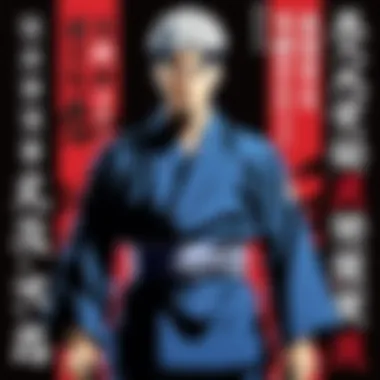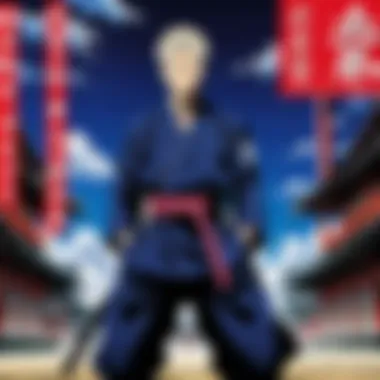Exploring the Role of Subtitles in Jujutsu Kaisen


Intro
Jujutsu Kaisen has snagged the attention of anime watchers across the globe for its gripping storyline and dynamic characters. But beyond the flashy battles and intricate plot twists, there's a lesser-discussed facet that plays a pivotal role in the viewer experience: subtitles. While some may brush them off as mere text translations, the reality is that subtitles hold a key place in how audiences connect with a story. They do not just relay dialogues but also capture the emotional weight and cultural nuances embedded within the original Japanese text. This article aims to explore how subtitles enrich Jujutsu Kaisen, enhancing viewer engagement and comprehension.
Character Profiles
Overview of Main Characters
Within Jujutsu Kaisen, characters like Yuji Itadori, Megumi Fushiguro, and Nobara Kugisaki aren’t just protagonists; they are vibrant embodiments of the series' themes. Yuji represents a conflicted hero grappling with morality as he swallows Sukuna’s fingers. Megumi, on the other hand, displays a stoic demeanor which belies his deep-seated loyalty to his friends. The subtitling of their dialogues is crucial; subtle word choices can greatly affect how audiences interpret their motivations and emotions.
Supporting Characters
Supporting characters like Satoru Gojo and Ryomen Sukuna add layers of complexity to the unfolding narrative. Gojo, with his playful yet powerful persona, often delivers lines brimming with sarcasm that may not translate directly into English. The subtitling here offers a window into his character's playfulness and larger-than-life presence.
"It's not just about the words. It's about what lies beneath them."
Each subtitle becomes a part of the character’s signature style; this adds depth while preserving cultural context, making their personalities resonate more distinctly with an international audience.
Theme Exploration
Central Themes
Themes of friendship, sacrifice, and the struggle between good and evil permeate the show. The subtitled dialogue allows viewers to grasp these themes through carefully chosen translations, reflecting the characters' intentions accurately. For instance, when Yuji struggles with his decisions, the subtitles betray the earnest conflict within him, making it palpable for those reading in English.
Cultural References
Japanese media is rife with cultural references that may baffle non-native viewers. Subtitles enrich understanding by providing equivalent expressions or footnotes that explain local customs and sayings. For example, when a character uses a phrase like "Onna no ko" (女の子), meaning girl, subtitling can add context about societal expectations surrounding gender, thus helping viewers connect more intimately with the narrative.
Popular Series and Recommendations
Top Anime Series of the Year
If one finds Jujutsu Kaisen compelling, it’s worth checking out similar series that stir the soul and enchant the mind. Recommendations include:
- Demon Slayer: Features similar peril and emotional weight.
- Attack on Titan: Delves into dark themes of survival and sacrifice.
- My Hero Academia: An entertaining ride through heroism.
Hidden Gems in Manga
For those wishing to delve deeper into the manga lane, these titles shouldn’t be missed:
- Tokyo Ghoul
- Chainsaw Man
- Berserk
Each has unique narratives and character arcs that can be even better understood with thoughtful translation and effective subtitles.
Prologue to Jujutsu Kaisen
Jujutsu Kaisen has stirred quite the ruckus in the anime community since its debut. This introduction aims to lay the groundwork for understanding the anime's significance, not just as a narrative driven by characters and plot but also as a cultural phenomenon. From its vibrant animation to its deep-rooted themes of curses and sorcery, there's much to unravel.
Overview of the Anime
At its core, Jujutsu Kaisen follows Yuji Itadori, a high school student who finds himself embroiled in a world filled with curses, supernatural battles, and sorcerers. It tackles weighty themes, such as the nature of fear and the price of strength. The storyline interlaces personal struggles with societal issues, creating a rich tapestry that resonates with audiences of all ages. This narrative complexity showcases why the anime is not merely entertaining but thought-provoking.
- The mix of action, horror, and humor keeps viewers on their toes.
- Strong character development allows audiences to form emotional connections.
- Each episode leaves viewers craving for more, a testament to its cliff-hanging plot points.
Once you peel back the layers, you realize that Jujutsu Kaisen is more than just flashy visuals and intense battles; it reflects underlying philosophical questions and societal dynamics that demand attention.
Cultural Relevance and Popularity
Not only has Jujutsu Kaisen captured the hearts of anime fans globally, but it has also opened doors for discussions about the cultural influences at play. It doesn't shy away from diving into Japan's rich folklore while introducing new, unique concepts to a worldwide audience.
- The anime has ignited conversations about Japanese culture, mythology, and even the mental health aspects portrayed through its characters.
- Its success has spurred a resurgence in interest for shonen anime, impacting trends not just in Japan but across the globe.
Its climbing popularity has led to awards and recognitions that underscore its place in modern anime history. The effect Jujutsu Kaisen has had on the anime landscape is palpable. As fans discuss their favorite moments online, analyze character arcs, and debate plot theories, the significance of subtitles in delivering the essence can't be overlooked. With subtitles acting as bridges across language barriers, they profoundly influence how non-Japanese viewers engage with the story.
"For anime like Jujutsu Kaisen, subtitles serve as both a practical necessity and a cultural conduit, ensuring that viewers grasp not only words but the emotions and intent behind them."
This engagement underscores that subtitles play a pivotal role in sustaining the anime's growing fandom all over the world. Understanding this aspect deepens the appreciation for Jujutsu Kaisen, paving the way for a more comprehensive exploration of how subtitling impacts viewer experience.
The Role of Subtitles in Anime
The role of subtitles in anime goes far beyond mere translation of words from one language to another. In the context of Jujutsu Kaisen, subtitles serve as bridges that connect diverse audiences to the intricate storylines and rich character development. They offer viewers a way to appreciate cultural nuances and socio-linguistic intricacies that would otherwise be lost in translation.
Functionality of Subtitles


Subtitles function as an essential tool for conveying dialogue while retaining the original emotion and intent of the scenes. They help viewers follow along with the story, ensuring that no critical lines of dialogue slip through the cracks. For a series like Jujutsu Kaisen, which is packed with emotional depth and complex interactions, this functionality cannot be overstated.
Here’s a closer look at why subtitles are important:
- Enhancing Comprehension: Many viewers, especially those who may not speak Japanese, rely on subtitles to understand the plot and character motivations. Subtitles make the dialogue accessible, offering a clearer grasp of the storyline.
- Capturing Tone and Emotion: Subtitles can preserve the tone of voice expressed by the characters. Even if the exact words can't be translated, capturing the essence of what's being said can evoke similar reactions from the audience.
- Cultural Insights: Japanese dialogue often contains references to sayings or customs that may not translate easily. Subtitles can help contextualize these, allowing international fans of Jujutsu Kaisen to appreciate the story in its rich cultural setting.
"Subtitles are the silent narrators in anime’s world, guiding viewers through every plot twist and turn."
Types of Subtitles: Closed vs. Open
When discussing subtitles, another important aspect is the distinction between closed and open subtitles. Each type comes with its own set of implications for the viewer's experience.
- Closed Subtitles: These are the kind often found in streaming services where viewers have the choice to turn them on or off. This flexibility is crucial as it caters to diverse preferences within the audience. Some may prefer watching without subtitles to immerse fully in the visuals and the Japanese dialogue, while others benefit from the added textual assistance.
- Open Subtitles: Unlike closed subtitles, these are permanently embedded into the video. This ensures that every viewer sees the translation. While this might restrict viewers who wish to watch without text, it guarantees accessibility for those who rely on them to understand the content.
Both types play significant roles in aiding comprehension, though the choice between them can affect how one experiences Jujutsu Kaisen. In a fast-paced action scene, for instance, open subtitles ensure that crucial lines of dialogue are not missed, as they remain visible throughout the viewing.
In sum, the role of subtitles in anime—especially in popular series like Jujutsu Kaisen—is multifaceted, offering significant benefits that enhance storytelling and viewer engagement.
Translation Challenges
Understanding translation challenges is crucial for any conversation about subtitles in Jujutsu Kaisen. The way in which dialogue is interpreted and delivered plays a major role in not only conveying the plot but also in reflecting the characters’ personalities and the story's emotional weight. As viewers, we tend to overlook the challenges faced by translators. Yet, the art of subtitling goes beyond mere word-for-word replacements. It involves a delicate balance of preserving meaning while adapting contextually.
Literal vs. Contextual Translation
When discussing translation, one must grapple with the distinction between literal and contextual translation. A literal translation sticks closely to the original wording, often leading to confusion. For instance, if a character in Jujutsu Kaisen exclaims, "It's raining cats and dogs!", a literal translation may leave viewers scratching their heads if they aren't familiar with the expression. Understanding such idioms requires cultural familiarity.
On the other hand, contextual translation takes more liberties. It aims to convey the sentiment and intent behind the words rather than just the surface meaning. In the case of a heavy scene, transforming a literal phrase to something relatable in a different language can significantly enhance impact. This approach is especially relevant in Jujutsu Kaisen, where emotional stakes are high and character dynamics are rich.
Effective subtitling thus favors contextual over literal translations to respect the source material while ensuring clarity for the audience. The goal is always to create a seamless viewing experience and, ultimately, to build a connection between the viewer and the narrative.
Cultural References and Their Impact
Cultural references laced throughout Jujutsu Kaisen also present challenges in translation. In various episodes, characters allude to Japanese folklore and societal norms that may not translate well. For example, a reference to Shinto beliefs may fly over the head of viewers unfamiliar with these concepts, leaving them disconnected from the narrative depth.
Translators need to find a way to either retain these references or offer equivalents that resonate with a non-Japanese audience. Sometimes they use footnotes, although these can disrupt the viewing flow. Instead, careful adaptation is often the better course—replacing a reference with something culturally relevant in the target audience's context.
"Without cultural adaptation, the viewer misses out on crucial character motivations and themes."
This careful attention to cultural nuance can tremendously amplify the viewer's connection to the series. Subtitles not only bridge the gap between languages but also between cultures, allowing for a richer appreciation of the story being told. By navigating translation challenges thoughtfully, the subtitlers contribute significantly to the Jujutsu Kaisen experience.
Elements of Effective Subtitle Design
Subtitle design plays a crucial role in ensuring that content in Jujutsu Kaisen is accessible and engaging to all viewers. As anime transcends cultural and linguistic barriers, the way subtitles are crafted can significantly enhance the storytelling experience. Effective subtitle design isn't merely a technical requirement; it’s fundamental to how audiences connect with the narrative and characters. Here’s a closer look at key aspects of subtitle design:
Timing and Synchronization
Timing is everything, especially when it comes to subtitles. If the subtitles appear too early or late, it can throw viewers off and disrupt their immersion in the story. For Jujutsu Kaisen, where fast-paced action is prevalent, the synchronization between audio and text becomes even more critical.
To achieve optimal timing, subtitle creators need to match the text with spoken dialogue and significant sound cues.
- For instance, if a character shouts a pivotal line during an intense battle, the subtitle should correspond in real-time to preserve the excitement of the scene.
- Moreover, it’s important to avoid overcrowding the screen with text, as too many subtitles at once can overwhelm the viewer. Effective design must allow room for the eye to read comfortably without missing visual elements on screen.
Font Style and Readability
The choice of font style and size is vital for viewer engagement. If the font looks like it was plucked from an old typewriter, it might not do justice to the sleek artwork of Jujutsu Kaisen. This series features modern aesthetics that deserve equally sophisticated fonts.
- Sans-serif fonts are often preferred because they are clean and easy to read.
- Important factors like contrast between the font color and background also demand attention. For example, white text against a dark background—typical in anime—is usually more legible than other combinations.
Additionally, varying font weights can convey emotions effectively.
- Bold text for shouting or emphasis draws audience focus and adds layers to character dialogues.
- Using italics could imply a softer tone or hints of inner thoughts, enhancing the viewers' understanding of character emotions.
Use of Colors in Subtitles
Color choices in subtitles are more than aesthetic; they influence emotional tone and character identification. In a show like Jujutsu Kaisen, different colors can significantly enhance the viewing experience:
- Character-specific colors create a visual association between dialogue and the speaker, helping viewers differentiate characters.
- Contextual colors can evoke emotions. For instance, red can signify danger or urgency, while blue may imply calmness or thoughtfulness.
- Furthermore, during critical plot points, using an eye-catching color can guide audience attention right where it’s needed.
Global platforms often feature different approaches to subtitle color, leading to a rich tapestry of choices that cater to various viewers. Ultimately, the goal is to create a subtle synergy between subtitles and viewing experience, ensuring that they not just convey information but also resonate emotionally with audiences.
"Above all, the aim of an effective subtitle design is to serve the story, allowing viewers to connect deeply with the characters and their journeys as they experience the world of Jujutsu Kaisen."
In summary, understanding the elements of effective subtitle design—timing and synchronization, font style and readability, and the strategic use of colors—plays a pivotal role in enhancing the narrative experience in Jujutsu Kaisen. Each element contributes to making subtitles not just a functional tool but a bridge connecting viewers to the core of the series.
Character Dialogue and Subtitles


Character dialogue in Jujutsu Kaisen serves more than just a means of communication; it’s a window into the persona and conflicts shaping the narrative. In the fast-paced world of anime, where every frame matters, subtitles play a critical role in delivering these dialogues with clarity and context to an audience who may not be fluent in Japanese. Throughout the series, viewers encounter a rich tapestry of language styles and emotional nuances that subtitles help to articulate. This section addresses the significance of these subtitled dialogues, focusing on how they enhance character development and viewer engagement.
Character-Specific Language Styles
Each character in Jujutsu Kaisen has a distinct voice that reflects their backgrounds and personalities. For instance, Satoru Gojo often employs a casual tone mixed with playful banter, while a character like Megumi Fushiguro adopts a more reserved and contemplative manner of speaking. This variation in dialogue is crucial, as it shapes how we perceive these characters and their motivations.
The subtitles must capture the essence of these styles to provide the viewer with a true sense of who the characters are. For example, when Gojo makes a joke, the subtitle might employ colloquial terms or even puns that match his playful attitude, while sticking to a more serious tone when it’s Megumi's turn to speak, offering insights into his inner struggles.
By delicately balancing tone and context in subtitle translation, the creators help viewers to connect intimately with the characters. This nuanced presentation engages the audience, making the dialogue more relatable and understandable.
Dynamic Emphasis through Subtitles
Dynamic emphasis is another critical aspect of how subtitles enhance the storytelling in Jujutsu Kaisen. The intensity of a scene can fluctuate wildly—from light-hearted moments to high-stakes battles—requiring subtitles to adjust accordingly. For instance, during fights, subtitles may use bold face for key terms or crucial lines to signify urgency or emotional weight. This technique adds layers to the viewing experience, making it easier for audiences to grasp the gravity of the situation without losing the essence of the original dialogue.
Moreover, the use of color in subtitles can also elevate dynamic emphasis. Imagine a heated confrontation where a character’s frustration is expressed in red, contrasting with moments of calm dialogue in a cooler tone. Such visual cues serve to enhance emotional engagement and help viewers navigate the complex emotions presented on-screen.
"Subtitles are not just a translation; they are the bridge that connects viewers to the soul of a character."
In summary, character dialogue in Jujutsu Kaisen is intricately woven into the fabric of the show's appeal. Effective subtitling brings forth their unique language styles and delivers dynamic emphasis, enabling viewers to experience the anime as intended. The subtitled dialogues are a window into not only understanding but feeling the story in a way that transcends mere translation.
Viewer Experience and Engagement
In the dynamic landscape of Jujutsu Kaisen, subtitles represent a vital bridge connecting diverse audiences to rich storytelling. This connection is not merely about translating spoken words; it involves a delicate interplay of cultural relevance, emotional depth, and viewer engagement. By intricately designing subtitles, anime creators enhance the experience for viewers, allowing them to appreciate nuanced character dialogues and intricate plot twists, which might otherwise be lost in translation.
Subtitles and Comprehension
Subtitles serve an essential function in fostering comprehension among viewers. The intricacies of language can sometimes leave non-native speakers or even those unfamiliar with specific cultural references puzzled. Subtitles, by accurately translating dialogue, ensure that the core message and emotions conveyed by the characters are preserved.
Consider a scene where Yuji Itadori confronts a challenging situation, expressing feelings of fear and determination. A well-crafted subtitle not only captures the literal translation but conveys the emotional weight behind his words. This attention to language is necessary for a viewer’s understanding, promoting clearer mental imagery and engagement with the plot.
- Key Benefits of Subtitles for Comprehension:
- They bring clarity to complex dialogue.
- They aid in understanding cultural context, reducing confusion.
- They allow viewers to follow character development closely.
Impact on Emotional Connection
The role of subtitles extends beyond mere comprehension; they play a crucial part in shaping an emotional connection between the audience and the characters. When viewers watch Jujutsu Kaisen, they are not just passively consuming content; they are emotionally invested in the journeys of characters like Megumi Fushiguro and Nobara Kugisaki.
Well-crafted subtitles achieve more than translating words; they evoke feelings and facilitate empathy. For instance, when a character expresses vulnerability, the subtitles must reflect this emotional nuance effectively. Failing to do so may dilute the impact of pivotal moments, leaving viewers disconnected.
"Subtitles provide viewers not just information, but a platform to feel, react, and connect with the essence of the story."
An emotional connection is built through the careful choice of words and phrasing. Couples of words can shift the tone from light-hearted to profoundly serious, thereby influencing how viewers perceive a scene. If done right, subtitling transcends language barriers and makes universal themes and personal struggles accessible to audiences worldwide.
- Factors Influencing Emotional Connection through Subtitles:
- Use of tone and context-sensitive language.
- Delivery timing that complements character expressions.
- Cultural references that resonate with the target audience.
In summation, subtitles in Jujutsu Kaisen are not merely functional elements; they are pivotal to enhancing viewer experience and fostering emotional engagement. This intricate process of translation, adaptation, and design turns watching anime into an immersive experience, allowing audiences to dive deep into the heart of its narrative.
Localizing Jujutsu Kaisen
Localizing Jujutsu Kaisen holds immense significance in the overall appreciation of the series. As it navigates a labyrinth of cultural references and linguistic subtleties, the process of localization ensures that the essence of the original work resonates with international audiences. A great anime like Jujutsu Kaisen encapsulates deep-rooted cultural nuances that often get lost in translation. Therefore, localization is not merely about substituting words; it's about creating a bridge that conveys the original context, humor, and emotion. This process enriches the viewer's experience substantially.
Language Nuances in Subtitling
Language nuances are the salt and pepper of subtitles. They add flavor to the dialogue and help convey meaning beyond mere words. In Jujutsu Kaisen, nuances come into play through character dialogue, tone, and even idiosyncratic phrases that reflect cultural idiosyncrasies. For instance, the use of honorifics in Japanese language indicates levels of hierarchy and respect. Subtitlers must decide when to retain these nuances or adapt them for a Western audience. Do they choose to keep the honorifics like "kun" or "san"? Or do they replace them with Western equivalents like “Mr.” or “Ms.”?
Adapting these phrases can vary between preserving the Japanese sense of respect or making the language more relatable to an audience that isn't familiar with these conventions. In some dialogues, a character might use informal slang that resonates with a young Japanese audience. Capturing that spirit can be tricky. A literal translation could miss the mark entirely, while a contextual adaptation can make the dialogue come alive.
Cultural Adaptations in Dialogue
When it comes to cultural adaptations, it's more like cooking a delicate recipe than flipping a switch. Anime often features references that are distinctly tied to Japanese culture, which don't translate neatly into other languages. For example, a character might make a joke based on a popular Japanese seasonal festival or cultural meme. To ensure that such lines have the desired impact on an international audience, subtitlers may opt for creative adaptations.
Consider a scenario where a character refers to a popular local snack or a familiar saying in Japanese. This type of humor might not resonate with non-Japanese viewers. Here, localization comes to the forefront. Subtitlers must not only translate the text, but also find an equivalent that a global audience can grasp while maintaining the humor’s intent.
Moreover, some expressions that stem from Japanese culture are filled with connotations that are difficult to convey. An astute subtitler might choose to add footnotes or brief explanations to help audiences understand the broader cultural context without detracting from the immersive experience.
"Localization isn’t just translation; it’s about preserving the soul of the content while making it relatable to everyone across the globe."
By delving into language nuances and cultural adaptations, viewers can truly appreciate Jujutsu Kaisen for its storytelling and emotional depth. Therefore, localization is not simply an afterthought, but rather a critical element that breathes life into an anime series, enabling it to transcend borders and resonate in a diverse cultural tapestry.
Subtitles and Accessibility
Accessibility is a key component in the viewing experience of any anime, and Jujutsu Kaisen is no exception. The way subtitles are integrated into the series can sometimes make or break the immersion for a vast array of viewers. Subtitles are not just an added layer; they are fundamentally important for ensuring that all audiences can enjoy the narrative without barriers related to language or hearing impairments.


Reaching Diverse Audiences
The anime landscape has grown tremendously in popularity, and Jujutsu Kaisen has carved out a significant niche. To appropriately reach this diverse audience, maintaining accessibility through effective subtitles is pivotal. It allows non-Japanese speaking viewers to comprehend the sophisticated plot and character developments. The localization of dialogues, idioms, and cultural references can greatly affect how viewers connect with characters. In this regard, good subtitles will ensure that viewers from various cultural backgrounds can grasp the nuanced language and humor.
- Cultural Nuance: Subtitles give us an insight into specific cultural references that might be lost without context. Translations can adapt phrases that hold deeper meanings culturally, making the experience richer for viewers unfamiliar with Japanese culture.
- Context Understanding: The way a character expresses themselves can indicate their personality or emotional state. Good subtitling conveys that nuance, helping diverse viewers relate to the characters on screen.
The goal is to provide a viewing experience that resonates with people regardless of their primary language. When subtitles are thoughtfully crafted, they open doors to understanding the ethos of the series while making it accessible to a range of viewers.
Support for the Hearing Impaired
Subtitles serve another critical function: providing support for the hearing impaired. For those who might struggle to enjoy Jujutsu Kaisen without auditory immersion, subtitles bridge a significant divide. When done right, subtitles can replicate the emotions and atmosphere conveyed through the voice acting. However, effective subtitling for individuals with hearing impairments goes beyond basic dialogue; it often includes descriptions of sound effects, music cues, and even the tone of the characters which can dramatically change the vieweing experience.
- Sound Descriptions: By including information such as [ominous music] or [character screams], subtitles give context to the on-screen action that contributes to atmosphere and feels. This aspect is especially important in a series like Jujutsu Kaisen, where tension and energy levels can shift in the blink of an eye.
- Clear Formatting: Readable fonts and strategic placement also enhance accessibility. Subtitles should never clutter the screen or detract from the visuals; they should serve in harmony with the action.
Comparative Analysis of Subtitle Formats
When delving into the realm of subtitles for anime, particularly in Jujutsu Kaisen, it's essential to assess how different subtitle formats not only affect the viewing experience but also alter the nuances of dialogue. The formats reflect various cultural backgrounds and technical approaches that can either enhance or hinder comprehension and engagement.
Subtitles in Different Regions
Subtitles often vary significantly across regions. For instance, in Japan, subtitles may prioritize accuracy while using a more straightforward font, designed to complement the animation without overshadowing it. In contrast, western audiences might enjoy subtitles that take liberties in translation, sometimes incorporating humor or idiomatic expressions that resonate with a particular cultural background. The effectiveness of these translations hinges on their ability to balance fidelity to the original language with relatability for the target audience.
- Differences in timing:
Subtitles in Asia can reflect a more synchronized approach to dialogues matched with visual cues, whereas those in North America may have slight delays to allow viewers time to absorb the translation. - Cultural adaptation plays a crucial role, as references to local pop culture, food, or societal norms can be more impactful for regional viewers while signaling an effort to frame the narrative in familiar contexts.
"Subtitles act not only as a bridge but as a canvas, painting perceptions that are uniquely experienced across cultural landscapes."
Dubbing vs. Subtitling Debate
The perennial debate of dubbing vs. subtitling carries significant weight in discussions surrounding Jujutsu Kaisen. Fans often find themselves divided: some cling to the original voice acting, feeling it offers nuances that a dubbed version might not capture. Others argue that dubbing enhances accessibility, allowing viewers to focus entirely on the visuals without reading.
When evaluating the merits of each:
- Dubbing:
- Subtitling:
- Pros: Makes content more accessible to those who struggle to read at speed or have visual impairments.
- Cons: Voice acting can miss the subtle emotional cues and prosody found in the original language.
- Pros: Retains original audio, offering viewers the authentic experience of Jujutsu Kaisen.
- Cons: Can sometimes distract viewers if poorly timed with the action on screen.
Both formats present unique challenges and benefits. Ultimately, the preference comes down to individual viewer needs and how they wish to experience the depth of Jujutsu Kaisen's narrative.
As we analyze these subtitle formats, it becomes evident that they influence more than just translation; they shape the very essence of storytelling in anime, inviting a spectrum of interpretations and emotional connections.
Recent Trends in Subtitling for Anime
Subtitling for anime is evolving, keeping pace with technological advancements and shifting viewer expectations. This evolution plays a pivotal role in the overall experience of shows like Jujutsu Kaisen. By understanding the recent trends in subtitle production, we can appreciate how they enhance the narrative while resonating with a global audience.
Advancements in Technology
The impact of technology on subtitling cannot be overstated. Tools for creating and editing subtitles have become more sophisticated, streamlining processes that were once labor-intensive.
- Automation: Programs now exist that can generate subtitles automatically using voice recognition. While this does speed things up, the quality can sometimes miss the mark.
- Machine Learning: As algorithms learn from human input, accuracy improves. This means that subtitled translations are not only faster but are increasingly contextual.
One could argue that technology is both a boon and a bane. While it definitely enhances efficiency, it may risk losing some nuances that human translators might catch. The trick is to blend machine assistance with human oversight to ensure clarity and emotional resonance.
Crowdsourced Subtitles
Crowdsourcing has emerged as a powerful way to tackle the subtitling challenge. Anime fans often take matters into their own hands, contributing translations that may even rival professional efforts. This trend brings several strengths to the table:
- Diverse Perspectives: Fans from various backgrounds offer fresh insights, leading to translations that are rich in local flavor and cultural context.
- Speedy Turnaround: When a new episode drops, fans are eager to watch it. Crowdsourced subtitles often appear within hours, keeping content fresh and relevant for viewers eager to engage with the latest developments.
However, this approach isn’t without its downsides. The quality of crowdsourced subtitles can be inconsistent, as not every fan will have a deep understanding of both languages and nuanced cultural references. That's why some communities tend to develop reputations for producing high-quality work, which in turn influences viewer loyalty.
"While crowdsourced subtitles are driven by enthusiasm, they highlight the balancing act between speed and quality that many fans have to navigate."
In summary, the recent trends in subtitling are reshaping how anime is consumed worldwide. As technology continues to evolve, and viewers remain engaged, the subtitling landscape for shows like Jujutsu Kaisen will surely keep changing, offering more options and improved experiences for audiences everywhere.
Epilogue
The role of subtitles in Jujutsu Kaisen goes beyond mere translation; they serve as a bridge between cultures, connecting viewers with the deeper narrative intricacies that the anime presents. Subtitles not only enhance comprehension but they also add a layer of emotional resonance, enriching the viewing experience for audiences far and wide. Given the complex themes and character developments within Jujutsu Kaisen, effective subtitling can elucidate nuances that might otherwise be lost in direct translation.
Summary of Key Insights
- Cultural Context: The subtitling process in Jujutsu Kaisen incorporates an understanding of Japanese culture, ensuring viewers grasp the significance behind dialogues and interactions. These refinements are crucial to delivering an authentic viewing experience that resonates with fans, particularly those unfamiliar with the cultural underpinnings.
- Viewer Engagement: Subtitles give viewers the chance to immerse themselves completely into the story without the distraction of language barriers. Engaging subtitles can draw audiences into the emotional landscapes of characters, such as Yuji Itadori or Satoru Gojo, effectively enhancing the narrative through connections formed via language.
- Diverse Audience Reach: The accessibility of Jujutsu Kaisen through thoughtful subtitling allows it to attract a varied audience. People from different linguistic backgrounds can enjoy the anime's storyline, themes, and characters, fostering a global community of fans who can discuss and dissect episodes together.
Future of Subtitles in Anime
The future of subtitles in anime like Jujutsu Kaisen seems bright, driven by rapid advancements in technology and an increasing demand for more personalized viewing experiences. Here are some key trends expected to shape subtitling:
- Artificial Intelligence: With the rise of AI-driven translation tools, subtitling is set to become more agile. However, human oversight remains essential in capturing cultural nuances and emotional depth, which machines often miss.
- Interactive Subtitles: As streaming platforms evolve, interactive subtitles might gain traction. These allow fans to choose different translations or explanations for particular phrases, enhancing understanding of difficult concepts or cultural references.
- Crowdsourced Efforts: Platforms like Reddit are enabling fans to contribute translations, fostering community involvement and ensuring a diverse range of interpretations that can offer richer contexts to the original scripts.
- Cross-Platform Viewing: As anime migrates to various media formats, subtitling practices will likely adapt. For instance, subtitles may be custom-tailored for mobile users versus traditional TV watchers, changing the dynamics of readability and presentation.
In summary, while Jujutsu Kaisen sets a high standard for anime, the ongoing evolution of subtitles promises to further enhance the art of storytelling, ensuring that it remains an accessible, engaging medium for fans around the world.







